If you are looking for the best OKR software available in the market you have come to the right place.
OKR or objective and Key Results are a way of setting goals that have become popular due to their simplicity and the benefits the method provides.
And as is true with most things in our modern world, there is a load of OKR tools and software to help you create, manage, and track these OKR goals.
That is why we have researched, rated, and curated this list of the best OKR software available to choose from.
However, before we can get on to our list of the best OKR software, you may be wondering a little about what such software is and what it can offer.
What is OKR Software?
OKR or Objective and Key Results were popularized by John Doerr a couple of years ago. Overall, on Doerr’s part, OKRs serve as an effective goal-setting framework.
With OKR you can create a basis on which you define your organizational objectives within a specific period of time.
To read more about OKR in general check out our blog post on writing OKRs for effective goal-setting.
OKR software on the other hand is a dedicated platform where you and your team can set, track, communicate, and assess goals and the results of work done within your company’s processes.
Such OKR tools are great to allow management and team leaders to easily set and monitor goals that they set for both teams and individuals in different departments.
Team members also benefit from a centralized place where they can voice concerns and record progress or any issues that arise.
Here are the best OKR software available for you to choose from to implement into your organization.
Best OKR Software Available
Table of Contents

Top OKR Apps for 2024
1. nTask
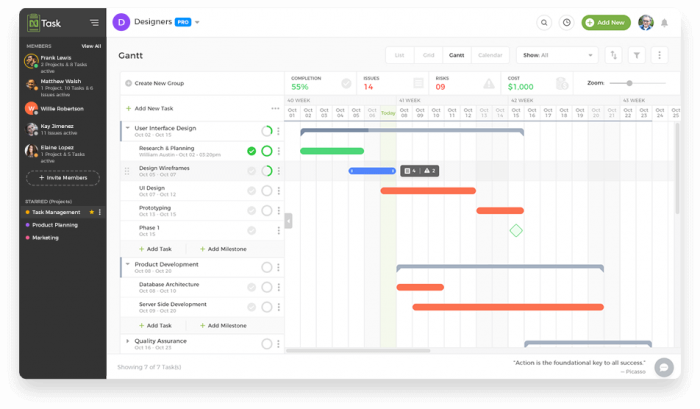
nTask is a project management tool but with its feature-packed platform with the ability to monitor and track OKRs, numerous integrations, user-friendly interface, and ample support and onboarding tools it is our top pick for the best OKR software.
nTask offers the ability to track and manage activities of individual contributors where you can use the feature available for individual accountability and ensure timely task and goal completion.
Key Features:
- Gantt charts for creating a timeline, budget info, and workflow management
- Milestones tracking for project goals setting
- Task management features
- Progress tracking
- Timesheets features
- Communication tools
- Meeting management with feedback options
- Feedback management
Pricing:
- The basic plan for free
- Issues tracking
- Timesheets
- Meetings
- Unlimited tasks
- Unlimited workspaces
- Limit of 5 members per team
- 100 MB storage
- Premium $3 per month
- Everything provided in the basic plan, plus
- 5 GB storage
- Projects
- Gantt
- Bulk Actions
- Custom filters
- Business plan for $8 per month
- Everything provided in the premium plan, plus
- 10 GB storage
- Save custom filters
- Risk management
- Custom roles and permissions

-
Try the best app to manage your OKRs.
Manage projects, tasks, to-do lists, and timesheets all in one place. Sign up today!
- Get Started for Free
2. Weekdone
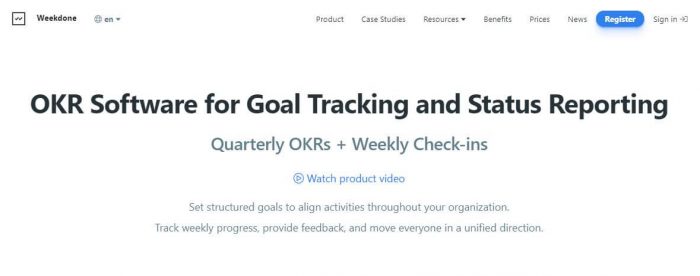
Weekdone is an OKR software that combines weekly check-in functionality and coaching to help you with long-lasting company changes.
This software is a great choice for small to medium-sized teams or companies. With Weekdone you have the tools and features to support goal-oriented company culture, drive company outcomes while focusing on your team.
Key Features:
- Objective progress tracking
- Performance analysis
- OKR linking
- Weekly planning
- Customized team reports
- Goal setting and management
- Achievement sharing
- Employee feedback
Pricing:
- Weekdone is free to use for up to 3 users
- Weekdone offers per-user pricing which decreases as you grow. For 4-10 users, the price is $90/per month
3. Engagedly
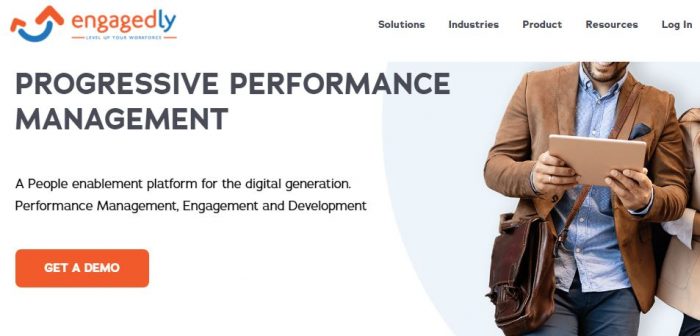
Engagedly is an employee performance management software.
With Engagedly you have a performance review software that incorporates elements of employee engagement.
The platform allows you to align and motivate your workforce with features such as goal setting, peer praise, and much more.
Key Features:
- Goal management
- Real-time progress tracking
- Strategic planning
- KPI monitoring
- Negative feedback management
- Ability to set organizational goals
- Ability to praise and recognize team member’s achievements
Pricing:
- For pricing contact the provider
4. Koan
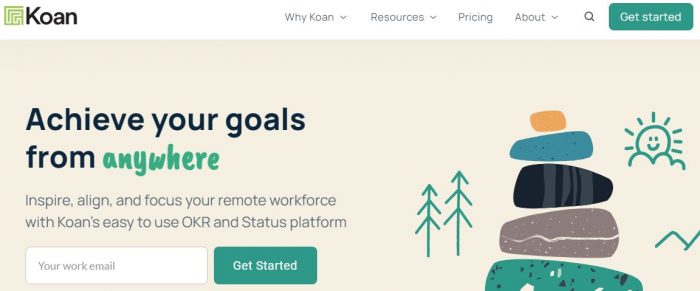
Koan is the next pick on our list and is an OKR and status platform. With Koan you and your team can easily align goals.
The tool is a great choice when wanting to align remote workforce and is perfect for small teams.
Key Features:
- Goal management
- Progress tracking
- Strategic planning
- Negative feedback management
- Employee recognition
- Performance management
Pricing:
- Koan offers a free plan
- The pro plan costs $6/user, per month
5. 7Geese
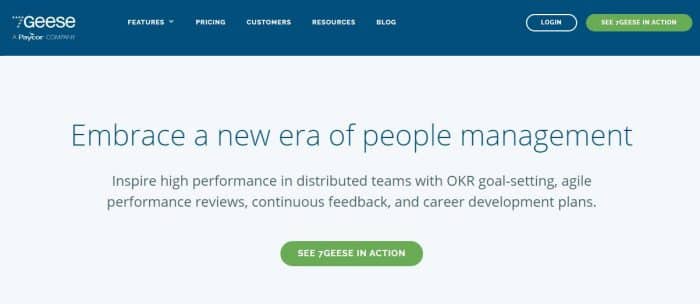
7Geese is a cloud-based performance management software and with its employee-rich features is a great choice for HR teams and other companies looking for individual performance management.
The software is aimed at helping company goal-setting and management while simultaneously monitoring employee engagement.
Key Features:
- Communication tools
- Customizable forms
- Company goals and OKRs
- Goal-setting
- Continuous feedback
- Review status tracking
Pricing:
- The Align plan is for $10/user, per month
- The Perform plan is for $14/user, per month
- The Grow plan is for $19/user, per month
6. PeopleGoal
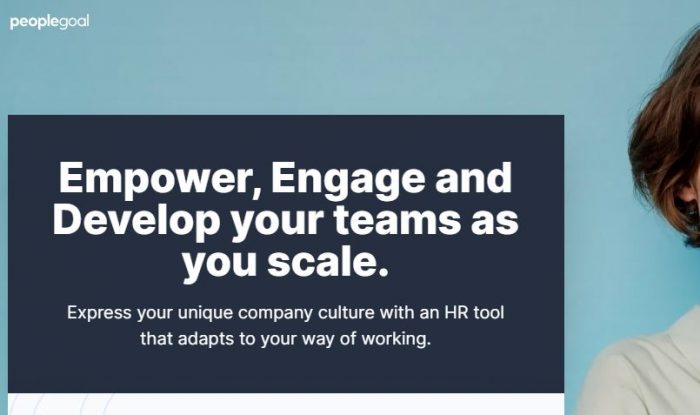
PeopleGoal made it onto our list as the best ORK solution for HR departments.
PeopleGoal is a feature-packed platform including tools such as a customizable system for feedback and a balanced scorecard approach to goal-setting.
The tool also comes equipped with multiple integrations. And all packed in an aesthetic design.
Key Features:
- 360-degree feedback
- On-going performance tracking
- Skills assessments
- Customizable dashboards
- Progress tracking
- Goal management
- Strategic planning
- KPI monitoring
Pricing:
- The Professional plan is for $10/user, per month
7. Heartpace
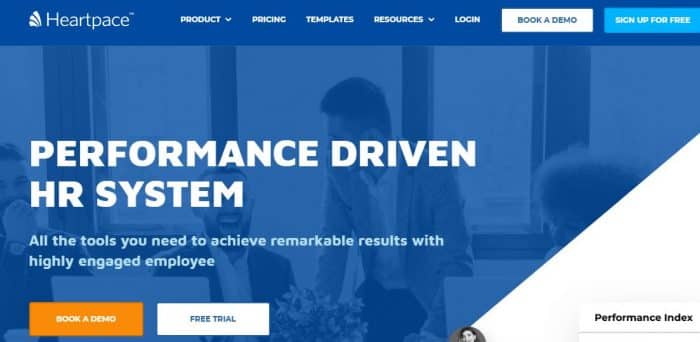
If you are looking for personal OKR software to set individual goals, Heartpace is the software for you although the tool is great for teams as well.
With Heartpace you have comprehensive employee pages which help to organize objectives according to the specific goals of individuals.
Packed with features and built-in integrations such as G Suite, AD LDAP Sync, and more the tool is definitely a contender.
Key Features:
- 360-degree feedback
- On-going Performance management and tracking
- Customizable dashboards
- Progress tracking
- Strategic planning
- Goal management
- Skills assessments
Pricing:
- Performance management for up to 50 users for €5/month, per user
- You could also get a custom quote depending on your team, contact the provider for this option.
8. Simple OKR
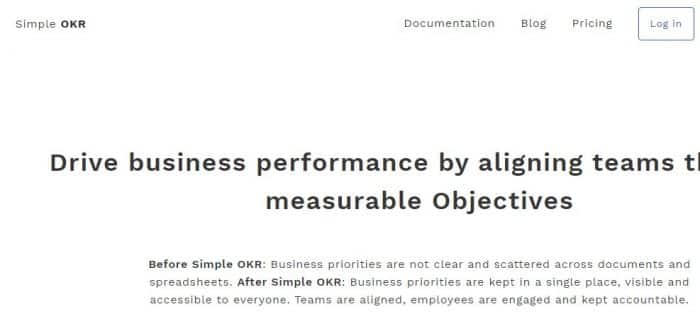
Simple OKR is an OKR management tool that is perfect whether you are looking for a solution for your company, team, or individual use.
Simple OKR has an intuitive user interface and portrays data on a single, simple dashboard.
With the tool, everyone has easy access to business priorities and teams are aligned on their goals while being accountable to higher management.
Key Features:
- Progress tracking
- Goal management
- Negative feedback management
- Set and share objectives with team members
- Easy view of company priorities
Pricing:
- You can access Simple OKR for $49.99/month
9. Betterworks
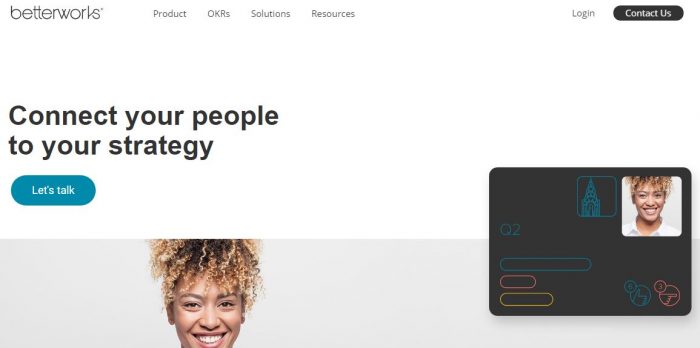
Betterworks was created to provide a platform to help unify your organization and empower employees to perform through commitment, alignment, and transparency which is the basis of the OKR module.
The tool comes equipped with multiple integrations to ensure a streamlined workflow for your team.
You can even benefit from the Betterworks coaching that helps users craft their first OKRs if they are new to the concept.
Key Features:
- Goals and alignment
- Insights and analytics
- Real-time insights into employee performance
- Communication tools
- Feedback and recognition
Pricing:
- For pricing contact the provider
10. Perdoo
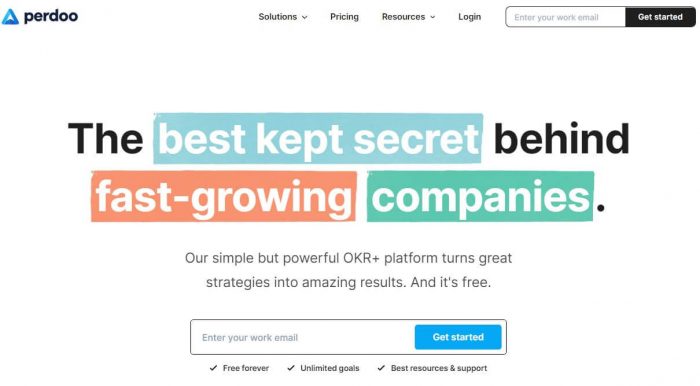
Perdoo made it onto our list as a great tool to evaluate KPIs along with OKRs.
This OKR goal management platform is suited for all sized teams or businesses and offers a centralized platform where your entire team can monitor the week’s achievements with ease.
Perdoo lets you share real-time strategies, set goals, align resources, and evaluate progress with reports.
Key Features:
- Alignment map
- Success surveys
- Engagement reports
- OKR reviews
- OKR setting and tracking
- OKR visualizations
- Goal alignment
- Conversations
Pricing:
- Perdoo offers a starter plan which is free of cost
- The Premium plan costs $7.20/per user, per month
11. Profit
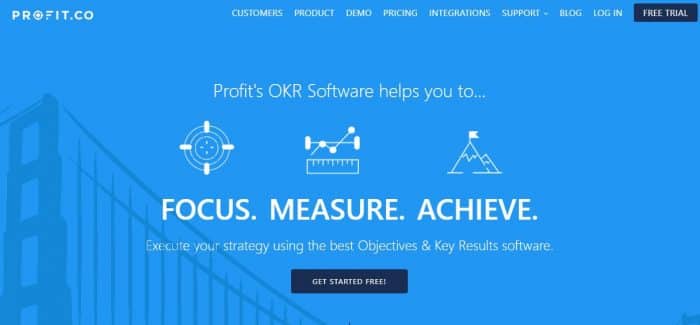
Profit is an OKR tracking software that lets you focus, measure, and achieves your strategy.
The tool offers features to focus and track both team and individual OKRs as well as team engagement on goals.
Key Features:
- Customizable templates and dashboards
- On-going performance tracking
- Skills assessments
- Goal management
- Progress tracking
- KPI monitoring
- Task management tools
Pricing:
- The startup plan is free of cost
- The Growth plan costs $7/month, per user
12. OKR API
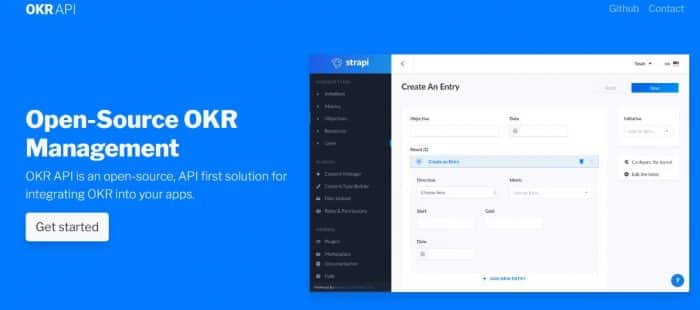
OKR API is a top pick for an open-source SaaS OKR tool.
The tool offers a novel approach to OKR management that allows you to create, manage, and deploy objectives and key results.
Key Features:
- Ability to integrate anywhere
- Headless OKR management
- Customizable content model
- Documentation
- Ability to manage metrics and log results
Pricing:
- To get information contact the provider
Criteria When Choosing an OKR Software
As is the case when choosing any type of software or tool for your organization or team there are certain considerations to keep in mind to ensure you are making the best possible choice.
When scouting and ranking the best OKR software for our list, we also considered these criteria.
They reportedly hold true when you are picking any type of software for your organization or team. These criteria include:
1. Ease of Use:
Whenever looking into implementing software into your organization you want to consider the ease of use of the software. How long will the onboarding process take? Does the software provider offer any sort of assistance, support, or training to make this process easier?
2. User Interface:
The user interface of any software is also a very valid and important consideration. You may want software that works like modern software yet still is accessible for low-tech individuals in your team. The user interface plays greatly with usability as well.
3. Cost and Available Pricing Plans:
Of course, the budget you are allocated to invest in software is also very important. With so many options of available OKR tools, you want to choose software that offers all the features you are looking for as well as being within your price range. Moreover, it is beneficial to look for pricing plans which are clear, transparent, and flexible.
4. Available Integrations:
You also want to choose an OKR software that is easy to connect to other tools and software, especially those you are currently using in your organization. Having such integrations ensures a smooth and streamlined workflow.
Apart from these general criteria to consider, you also want to consider other factors, mainly what features are available in the OKR tool you are considering and whether that specific tool will be able to solve the problems you are trying to address.
First things first you want to consider the size of your team even before looking at the features available.
Each software you consider will be handling the needs and dynamics of different-sized teams differently. Moreover, most tools charge per user as well so the size of your team factors in with the budget consideration mentioned above.
Here are some of the features you should look for in an OKR platform:
- Reporting and insights
- Check-ins and OKRs tracking
- Continuous conversation, feedback, and recognition features
- Ability to visualize the alignment
- Ready to use templates
- Actionable dashboards
- Goal maps
Examples Of Personal OKRs
These are the best OKR examples:
1. Before the end of the year, find a new job:
If your goal is to advance your career, some examples of actionable key results might be: connecting with 10 people who hold positions in your field at or above the level you want, completing five sessions with a mentor to prepare for interviews, contacting five hiring managers or recruiters in your network by May to discuss opportunities, or applying online for 10 positions by June.
2. Reduce expenditure on fast food by 50% by Q3
Spending money on unhealthy foods can have a detrimental influence on your health as well as your wallet and energy levels. If your ultimate objective is to reduce the amount of money you waste on unhealthy takeaway, some of your major outcomes might be learning to prepare 20 nutritious meals at home, cutting back on your takeout to once a week for the next four months, or bringing your lunch every day of the workweek until July.
Keep in mind that “cutting down” doesn’t mean completely ceasing. The goal of key results is not to be restricted but to change your habits. Don’t let minor mistakes keep you from accomplishing your goal!
3. Study a different language
Four of your outlined KRs could be: looking into and purchasing a language app for your phone, enrolling in a semester-long language course at a nearby college or university, spending an hour a day immersed in the language, or practicing with a native speaker of the language once a week.
Benefits Of Using Free OKR Tracking Software
1. Utilizes the efficiency of micro-tasking
Breaking down big projects into smaller, easier-to-manage pieces, or micro-tasking might help the project feel less onerous as a whole. Being able to often cross off little tasks from your to-do list will make you feel accomplished, which makes micro-tasking an effective productivity tool.
2. Makes you an expert at planning
To fit in important outcomes, you’ll need to carefully manage your timetable. Using the OKR methodology could be your saving grace if you are currently having trouble staying organized or managing your time.
3. Assists you in setting priorities:
It’s easy to understand: when you have a deadline and a thorough list of steps to take in order to accomplish a particular goal, it will be tougher to rationalize delaying the activity in favor of something else.
4. Increases the likelihood that goals will be achieved:
Let’s face it, we’re all guilty of setting impossible goals and getting angry when we don’t meet our own deadlines. With the help of OKRs, you may establish goals more deliberately and learn what you’re actually capable of accomplishing in a certain time frame.
FAQs
What is an OKR vs KPI?
KPI (Key Performance Indicators) are measures used by organizations to assess the performance of specific areas such as products, services, or processes. They help provide insight into how well an organization is doing in its efforts toward reaching a given goal. KPIs aim to give an indication of how well a task has been performed by measuring specific aspects related to the task, such as time taken, cost spent, the quality achieved, or customer satisfaction levels achieved.
What are good examples of OKRs?
1. Objective: Increase customer satisfaction
Key Result: Increase Net Promoter Score by 10% over the next quarter
2. Objective: Develop new products
Key Result: Introduce three new products within 6 months
3. Objective: Expand market share
Key Result: Obtain 5% more market share in the next year by entering new markets
4. Objective: Improve employee engagement
Key Result: Increase employee engagement scores from 50% to 75% in 6 months
What is OKR methodology?
The process begins with creating Objectives which are clear and inspirational goals that will help drive the company’s success. Then, you create Key Results – metrics for each objective that are measurable and have a timeline for completion so progress can be monitored objectively.
Once these two components are defined, they should form part of a written agreement between management and employees so everyone is committed to achieving them together. This helps ensure accountability within the organization while giving it structure at both individual and team levels.
Is OKR Agile methodology?
There You Have it!
There you go, our picks for the best OKR software available.
For more such informative and interesting content why not subscribe to our blog?
Good luck with your goal-setting journey!
Blogs You May Like:

